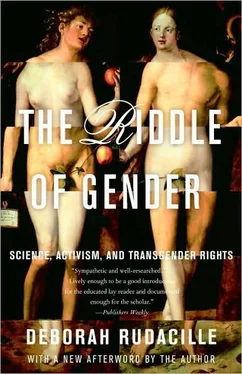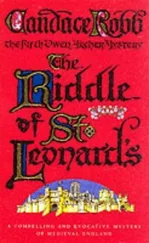So it’s a very bimodal thing, but of course in any spectrum there’s going to be something in between. I just think that’s biology; it’s just the way we are. I would think that a lot of transsexuals feel this way because otherwise why do they feel so strongly from the time they are born that there’s something wrong? Why can’t they just get used to the way they are? That doesn’t come from the way society treated me. That comes from deep within. It comes from within. That’s my own personal view.
Two
THROUGH SCIENCE TO JUSTICE
Plato was acquainted with persons on the borderline of both emotional worlds, that of man and that of women. “Mixed beings” they are called. But here in my sickly body dwelt two beings, separate from each other, unrelated to each other, hostile to each other, although they had compassion on each other, as they knew that this body had room for only one of them. One of these two beings had to disappear, or else both had to perish.
LILI ELBE (NEE EINAR WEGENER), BERLIN, 1930
Western science first took notice of cross-gendered people and tried to provide some kind of therapeutic assistance for those who sought it in the first decades of the twentieth century. Much of this work was carried out in Berlin, at the Institut für Sexualwissenschaft (Institute for Sexual Science), founded in 1919 by the pioneering physician and activist Magnus Hirschfeld. Housed in a beautiful old building in the heart of Berlin once owned by the violinist Joseph Joachim, the institute served as a doctor’s office for Hirschfeld and his colleagues, research facility, library, museum, and lecture hall. Hirschfeld and his staff studied a wide range of sexual behaviors and treated a broad array of clients, acquiring data on the gender identities and sexual practices of more than ten thousand men and women through a tool that Hirschfeld termed a “psychobiological questionnaire.”
Few people today recognize Hirschfeld’s name, and yet he was one of the most famous scientists in the world during the 1920s. Hirschfeld was the most prominent public figure in the first generation of sexologists, biological and social scientists who approached the study of human sexual behavior as a serious scholarly endeavor, best suited to interdisciplinary study. Hirschfeld was born in 1868. Early in his career as a physician he was drawn to the subjects that would become his life’s work. Stirred by the international furor over the trial of Oscar Wilde in England, Hirschfeld published a thirty-four-page monograph titled Sappho und Socrates, in which he asked, “How can one explain the love of men and women for people of their own sex?” In 1897 Hirschfeld founded the Scientific Humanitarian Committee, a group of scientists and activists who would work tirelessly for the next thirty years for the repeal of Paragraph 175, a German law criminalizing sexual acts between men. The motto of the committee was “through science to justice.”
In Hirschfeld’s Berlin, two crucial strands of modernity met and mingled. Berlin was a great scientific center in an era when Germany led the world in research, and it was also a place where gay and trans people were visible and in some respects tolerated. At the center of this coupling stood Hirschfeld, a gay man and a scientist, who existed comfortably in both worlds and brought them together in his work. The city of Berlin, “a strange million-headed city like a cuirass,” in the words of Hirschfeld’s patient Einar Wegener, was the womb that nurtured the budding sexologist. “Berlin, in Hirschfeld’s time, changed from a quiet, almost rural Prussian town into the large German capital and hectic metropolis,” writes Erwin J. Haeberle, in The Birth of Sexology, describing the environment that incubated the study of human sexual behavior. Haeberle notes that Hirschfeld and his contemporaries “lived through the most extraordinary scientific upheavals, technological innovations, cultural breakthroughs, social upheavals and political changes,” as Berlin was transformed from the city of Bismarck and Kaiser Wilhelm’s imperial residence to the heart of Weimar culture. “All of this had its impact on our pioneers,” Haeberle says. “It constituted the climate in which sexology was conceived and could grow.”
By the time Hirschfeld moved to Berlin, around the turn of the century, it was home to a growing gay subculture. Though still relatively quiet and discreet, Berlin’s gay underground proved a fertile environment for both the man and the researcher. Hirschfeld’s biographer Charlotte Wolff describes the city’s impact on the young physician.
“During the early years of the twentieth century, Hirschfeld certainly had a field day visiting pubs, hotels and the private houses of homosexuals to see, to learn and to live in an atmosphere which was close to his heart. His homosexuality was still a secret to many but, surely, clear to himself,” she says. But Hirschfeld wasn’t looking just for sex, love, and acceptance in Berlin’s gay bars and clubs. He was looking for research subjects—and attempting to persuade influential people that members of the “third sex” (homosexuals and gender-variant people) posed no threat to the community.
Hirschfeld escorted friends, fellow academics, and foreign writers to the bars. He even brought Dr. H. Kopp, the Kriminalkommissar (chief inspector) for sex offenses of the Berlin police department. Like many others who came into contact with Hirschfeld, Kopp was converted to his view and became a supporter of the Scientific Humanitarian Committee. In fact, the professor and the detective became friends, and many years later Dr. Harry Benjamin, author of The Transsexual Phenomenon, the first book-length scientific treatment of transsexual-ity and sex reassignment, recalled that it was Kopp who introduced him to Hirschfeld. “A couple of times I was invited to accompany Hirschfeld and Kopp, who were good friends, on tours through a few gay bars in Berlin. The most famous was the Eldorado, where mainly transvestites gathered and female impersonators performed. Hirschfeld was well known there and referred to as ‘Tante Magnesia.’”
Berlin’s reputation as the decadent drag nightclub of the Continent attracted many foreign visitors. Some of the most vivid descriptions of Weimar Berlin and its inhabitants were penned by the writer Christopher Isherwood, who with his friends Wystan and Stephen (the poets W. H. Auden and Stephen Spender) traveled to Berlin in search of the sexual freedom they could not find as gay men at home in England. Isherwood’s The Berlin Stories formed the basis for the Broadway show (and later film) Cabaret. Years later, in his frank memoir, Christopher and His Kind, published in 1976, Isherwood reveals the sly artifice behind the city’s seedy reputation, the knowing wink that accompanied the perverse erotic invitation. He contrasts the ambience of his favorite gay bar, The Cosy Corner, “plain, homely and unpretentious,” with the tourist traps of West End Berlin, “dens of pseudo-vice catering to heterosexual tourists. Here screaming boys in drag and mono-cled, Eton-cropped girls in dinner jackets play-acted the hijinks of Sodom and Gomorrah, horrifying the onlookers and reassuring them that Berlin was still the most decadent city in Europe.” Wryly, Isher-wood questions whether or not Berlin’s “famous decadence” wasn’t simply a public relations ploy, “a commercial line which the Berliners had instinctively developed in their competition with Paris. Paris had long since cornered the straight girl—market, so what was Berlin left to offer its visitors but a masquerade of perversions?” Like many hard-luck ladies, Berlin may have found that offering forbidden sex to strangers put food on the table. Still, the city’s winking tolerance of homosexuality and gender diversity was real, not feigned.
Читать дальше












